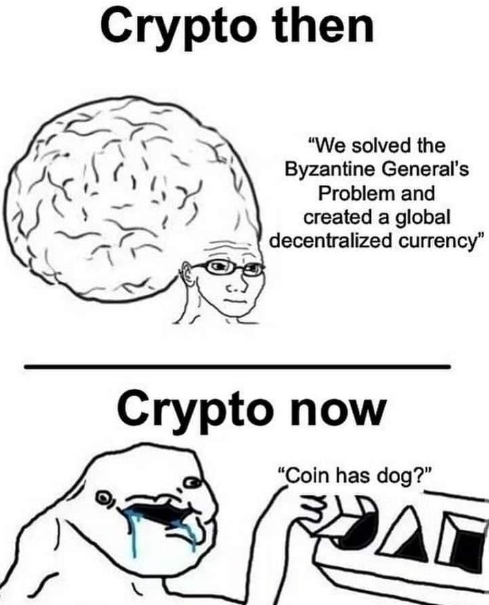Excitement around cryptocurrencies is at an all time high, with newbie investors looking for “the next Bitcoin” as their vehicle to striking it rich. But with little to no understanding of digital money, newcomers are highly vulnerable to losing money and falling prey to scammers.
Among the thousands of different cryptocurrencies currently on the market, only Bitcoin has potential as true digital currency. To help wade through the confusion, here’s a helpful guide to understanding Bitcoin, sh*tcoins, privacy coins, and how to decipher the scams.
What to Look [Out] For in Digital Money
When it comes to digital money there are a few features and functions a cryptocurrency should exhibit in order to contend with traditional money:
Finite:
A limited supply of monetary units- whatever the currency- is necessary in order to avoid inflation [the devaluation of the currency itself]. Regardless if it’s the lira, pound, or dollar, the current paper money used around the world and doled out by central banks is fiat; It’s backed by nothing, and because of this, can be printed into oblivion. With an infinite supply, each unit’s purchasing power lessens, and as Voltaire famously said: “Fiat currency always returns to its intrinsic value- zero.”
So, what does this have to do with cryptocurrency?
The same economic rules governing traditional money holds true for cryptocurrencies: Coins based off an infinite system have no value. Inflation would afflict the coins just as it does with paper money, or its digitized equivalent, and lead to inflation or hyperinflation eventually.
When researching cryptocurrencies, one of the first things to find out is if there’s a coin limit; If there’s an infinite supply this means those coins are simply extensions of the current financial fiat scheme and equally problematic. Stay away from such coins [hint: Stay away from all of them except Bitcoin].
Decentralized:
Bitcoin’s blockchain can’t be stopped unless the entire world’s internet was shut off at the same exact time, forever. The reason for this is that the system is massively decentralized: Thousands of servers around the world are running 24/7 to maintain the blockchain. If one computer turns off, the system remains untouched. If an entire country’s Bitcoin servers are taken offline, that too is of little consequence; the system is running in millions more homes and ‘server farms’ worldwide and will pick up the slack.
Unlike every other centralized system that’s come before, Bitcoin’s level of decentralization means that no rogue player, crypto scammer, or tyrannical government, can control it.
For a cryptocurrency to be viable as a true digital money for the people, decentralization is essential. Otherwise, the power to control the digital “currency” is controlled by whoever writes the code and is easily hijacked: Scammers can steal coins, governments can take control of the blockchain and manipulate the currency.
True decentralization is a necessary feature for any cryptocurrency to have lasting value [another reason why Bitcoin is the only contender in a sea of “crypto”].
Usability:
People don’t use technology that’s confusing or difficult to use. Since cryptocurrencies are meant to be used as money, they must provide a convenient, easy-to-use interface.
Any crypto worth its salt will have developers who focus on usability of the coin: Fast, easy apps, website payment plugins, and easy transactional ability.
Scaleability:
Payment processors like Venmo and PayPal are able to process payments within seconds of a transaction. This makes using these platforms easy to use, and therefore highly popular.
For any cryptocurrency going head-to-head against fiat money and popular payment processors, a cryptocurrency must be scaleable; Meaning, it must have the ability to process transactions extremely quickly [under 3 seconds or less to compete against the old guard].
Currently, Lightning Network is making scaleability a non-issue; Lightning makes Bitcoin transactions fast, convienient, and easy.
Bitcoin: The OG
Bitcoin was released in 2009 by pseudonymous cypherpunk[s], Satoshi Nakamoto, and is the first working digital currency which utilizes blockchain technology.
How Bitcoin works: The Bitcoin blockchain is a chain of “blocks”, these blocks are filled with data. This data contains every transaction ever to happen on the blockchain, complete with timestamps and digital “signatures”, like a ledger. Each block of data relies on every single block before it, so new information (like transactions) can be added to the blockchain, but there can never be any retroactive changes.
Unlike the current world financial system, the Bitcoin blockchain is completely independent of centralized banks, or any governmental institution; Instead, it is a worldwide distributed system, without any central authority, which relies on a completely transparent network, without the ability to defraud the system.
Bitcoin, and the blockchain technology on which it runs, is the foundation for all other cryptocurrencies that have been created. Now, Bitcoin is considered “digital gold”, a secure store of value, a way to transact with anyone in the world directly peer-to-peer, and a means through which people of world- regardless of country of origin- can bypass central banks, traditional banking institutions, their fiat monetary system, and inflation.
For a deeper dive on Bitcoin, read: Why Bitcoin [and Crypto] Will Succeed
Read Satoshi Nakamoto’s Bitcoin White Paper here: Bitcoin.org
Sh*t Coins:
According to “Bitcoin maximalists”, “sh*t coins” refer to all coins other than Bitcoin; those coins which lack scarcity, decentralization, have no discernible purpose, and are more scam than currency.
A real world example of a sh*t coin gone wrong is the Squid Game coin [circa 2021]. Riding on the wave of the popular Netflix series, Squid Game, two crypto developers created a coin by the same name. In a matter of weeks, investor money poured in, pushing its price from $0 per coin to over $2,800.
But there was a big catch that investors didn’t see: People could purchase the coins, but they couldn’t cash out. By week three, the coin creators pulled the rug out from under buyers and disappeared with $3.3 million. Everyone else was left with nothing but an empty pocketbook.
Dogecoin is another example of the ultimate sh*t coin: A crypto “currency” powered soley by the social power of memes. Dogecoin has an unlimited supply of coins, thus is as inflationary as all other fiat currencies, and has no other discernible function other than giving investors a good chuckle.
Nearly memory holed in the cryptospace, Dogecoin unexpectedly jumped to the forefront of cryptocurrencies due to its promotion by an unlikely fan: Billionaire Elon Musk. With a few tweets on Twitter, Musk’s endoresment shot the price per coin up by 22% in less than 24 hours. Small shops and online retailers began accepting the coin as payment, and thus far, is still holding value.

But just because a sh*t coin has seen some success doesn’t mean its time in the sun will last. A feature of sh*t coins is that they can crash to zero at any moment. If there’s an infinite supply of the coin, if its centralized, and if its raison d’etre is for pump and dumps or some laughs, this makes a fickle “currency”, and thus, a sh*t coin.
Privacy Coins:
Contrary to popular belief Bitcoin is not anonymous, and neither are most other cryptocurrencies. If a coin’s transactions are visible on its blockchain it’s considered a “transparent” coin [or in some circles, “surviellance” coins].
For Bitcoin and the others, this means that the entire transaction history is visible, as are wallets and the amount of coins in them at any given time. Now, this is a great tool for reigning in government spending by providing citizens with a transparent look into what their government is doing, but such a tool is just as easily turned against citizens for use as a massive surviellance apparatus.
One solution to this has been the advent of privacy coins.
Privacy coins protect user anonymity by obfuscating wallet addresses and transactions. In an increasingly survielled world, retaining one’s right to privacy is vital to maintaining personal freedom and autonomy, lest we find ourselves in an inescapable panopticon.
Privacy coin advocates argue that without the protection privacy coins provide, crypto users are left vulnerable to corrupt governments, malicious institutions, business competitors, and other bad actors; so, these coins are truly essential to the cryptospace.
However, there are many Bitcoin-only developers [“devs”] working on making Bitcoin transactions private, instead of using “sh*t coins”.
One solution developed are Coinmixers, which allow Bitcoin users to obfuscate identifying data and wallet addresses, anonymizing transaction information.
Privacy features are being built for Bitcoin, making privacy coins unnecessary in the long-run.
Final Thoughts
Thousands of cryptocurrencies are currently on the market, from the original Bitcoin, to “privacy coins” and “sh*t coins”.
Without a basic understanding of money, and the features of viable money, the vast array of “crypto” choices can feel overwhelming and leave one susceptible to scams and rug pulls.
In order to have real potential as digital currency, a coin should have a finite supply, be decentralized, usable, and scaleable. If a coin lacks these features, it’s worthless at best and a scam at worst.
This is why Bitcoin is the only real digital currency that can – and will – usurp fiat [paper fiat and sh*t coins alike].
Entering the realm of digital money comes with its own set of responsibilities, one of the most important being the research and analysis of a coin before throwing money down a digital hole. So before you go “all in” on the next Dogecoin, do your due diligence: Research and understand Bitcoin.
Citizen Xero does NOT use Google Analytics to track readers or earn money from Google advertisers. If you find these articles helpful, please consider donating to our Cointree to help keep this site running. We gratefully accept Bitcoin.
Related Posts: CBDCs: The Banksters’ Wet Dream [+ Why Bitcoin Wins]
What Is a Parallel Economy [A Road Map]
How to Buy Bitcoin Anonymously
Recent Posts
Humanity is entering a strange new paradigm; one in which all the rules of the game have been upended. Bubbling to the surface of our zeitgeist are earnest discussions of society’s current...
Millions of people are buying Bitcoin and leaving the dollar behind in the dust bin of monetary history. From unending money printing, to the inflation to which it inevitably leads, to governments...
